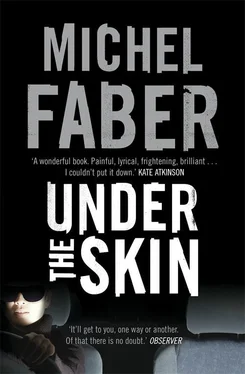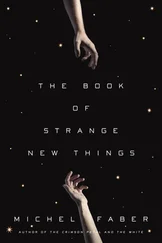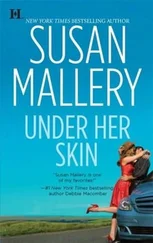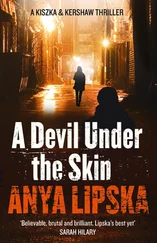‘Hasusse,’ she said between clenched teeth, and flipped the icpathua toggle.
He began to fall towards her; she shoved him back with the flat of her hand. He swayed away from her, his big shoulders tipping like a unstable bale of hay, his head bumping against the passenger window. Isserley flicked the indicator and eased the car off the road.
Safely parked in a layby, her motor still on, she pressed the button to darken the windscreen. It was the first time she’d ever been aware of doing so. Usually she was floating somewhere in space when this moment came; today she was solidly anchored in the driver’s seat, her hands on the controls. The glass went deep amber all around her, the world went dark and disappeared, and the little cabin light came on. She leaned her head back against the headrest and removed her glasses, listening to the rumble of distant traffic over the purr of her engine.
Her breathing, she noted, was perfectly normal. Her heart, which admittedly had been labouring a bit when she’d first let the vodsel into her car, was now beating quite tranquilly.
Whatever the problem had been, in the past, with her physical reactions, she seemed finally to have solved it.
She bent down to open the glove compartment. Two tears fell out of her eyes, onto the hitcher’s jeans. She frowned, unable to account for it.
Isserley drove directly back to Ablach Farm, trying to fathom, all the way there, what could possibly be wrong.
Of course the events of yesterday… or was it the day before?… She wasn’t exactly sure how long she had spent on the jetty afterwards… but anyway, those events… well, they had upset her, there was no denying that. But it was all in the past now. Water under the bridge, as the vodsels… as she’d heard it said.
Now she was driving past the abandoned steelworks, almost home, with a nice big vodsel propped up next to her, just like any other day. Life went on, there was work to be done. The past was dwindling, like something shrinking to a speck in the rear-view mirror, and the future was shining through the windscreen, demanding her full attention. She flicked her indicator at the Ablach sign.
As she drove over Rabbit Hill, she was ready to admit that she was perhaps not in such good shape. But, determined to pull herself together without wasting any more time, she already had a vision of what it would take for her to feel better. Something inside her was trapped. Something small: nothing serious. But still trapped.
To complete her recovery, to get herself back to normal, she needed to release it.
She felt sure she knew how.
Parking in front of the steading, she sounded her car’s horn, impatient for the men to come out.
The door rolled open to reveal, as usual, Ensel and the two cronies whose names she’d never bothered to memorize. Ensel, as usual, hurried out to peer through the car’s passenger window at what she’d brought home for them. Isserley braced herself for the usual platitude about the quality of the specimen.
‘Are you all right?’ grimaced Ensel through the glass. He was looking straight at her, ignoring the vodsel slumped under ill-fitting blond wig and sloppily applied anorak. ‘You’re… ah… you have some mud on your clothes.’
‘It will wash off,’ said Isserley frostily.
‘Of course, of course,’ said Ensel, cowed by her tone. He opened the door and the vodsel, poorly balanced, tumbled out like a sack of potatoes. Ensel leapt back in alarm, then snorted self-consciously and tried to rise above the mishap with panache. ‘Um… he’s a good one, isn’t he?’ he leered. ‘One of the best ever.’
Isserley didn’t deign to respond, but threw open her own door and stepped out of the car. Ensel, already busy with the other men dragging the vodsel backwards, registered her approach with a puzzled squint.
‘Something wrong?’ he grunted as he struggled to lift his burden onto a wheeled pallet. The weave of the vodsel’s knitted jumper was very loose and almost useless as a grip-handle.
‘No,’ said Isserley. ‘I’m coming with you, that’s all.’
She strode on ahead and leaned against the steading while the men staggered to catch up, pulling the pallet with the vodsel on it.
‘Uh… is there some problem?’ said Ensel.
‘No,’ said Isserley, calmly watching them bumble through the door at last. ‘I just want to see what happens.’
‘Oh yes?’ said Ensel, bewildered. The other men swivelled their heads to regard each other. Mutely they shuffled across the hangar floor, with Isserley walking beside them.
At the lift, there was an even more embarrassing moment. Clearly, there was only enough room inside for the men and their burden, not for Isserley as well.
‘Um… you know there’s really not that much to see,’ simpered Ensel as he jostled with his companions inside the great drum.
Isserley clawed off her glasses and hung them on the frayed neckline of her top, fixing Ensel with a steely glare as the lift began to seal itself shut.
‘Don’t start without me,’ she warned.
* * *
Isserley, standing alone in the dimly lit lift, allowed herself to be borne deeper and deeper into the earth. She passed the Dining and Recreation level, descended lower than the men’s sleeping quarters.
As she sank through the well-oiled, frictionless shaft, she kept her eyes on the seam that would open when she reached Transit Level. Transit Level was three storeys below the ground. There was nothing lower than Transit Level except the vodsel pens themselves.
She’d expected to feel uneasy, even panicky, going down so far. But when the lift stopped moving and the door slid open, all those arm’s-lengths below the ground, Isserley wasn’t aware of any nausea. She knew she was going to be all right. She was going to get what she needed.
The Processing Hall was the largest of the linked maze of rooms that made up Transit Level. Its ceiling was high, its dimensions generous, its lighting fierce, leaving no corner in the slightest shadow. It was like an automobile showroom gutted of its contents and sparsely reappointed for more organic purposes. There was plenty of air, breezing out of the many air-conditioning grilles in the whitewashed walls. There was even a hint of marine tang to it.
The hall was lined on three sides with long metal work-benches, unattended just now. Ensel and the other men, as well as Unser, the Chief Processor, were all gathered in the centre of the room, converged around a mechanical contraption Isserley knew must be the Cradle.
The Cradle, constructed from pieces of farm equipment, was a masterpiece of specialized design. Its base was the cannibalized mechanism of an earthmover, welded to a stainless-steel drinking trough. Mounted on top, chest-high to a human, was a two-metre segment of a grain chute, artfully beaten into an amended shape so that its sharp edges were curled harmlessly in on themselves. Gleaming and elegant like a giant gravy boat, the chute was being tilted mechanically on its unseen fulcrum, assuming a perfectly horizontal position.
The person adjusting the balance of the Cradle was Ensel, smug in his responsibility of personally assisting the Chief Processor; his two cronies were engaged in the less precise task of undressing the vodsel, lying nearby.
Unser, the Chief Processor – or the butcher, as he still insisted on calling himself – was washing himself. He was a compact, wiry man, who would have been scarcely taller than Isserley if he’d been a biped. He had massive knobbly wrists, though, and powerful hands, which he was holding aloft as he squatted on his hindquarters next to a metal tub.
He lifted his almost freakishly small, coarse-bristled head and sniffed the air, as if he was smelling the arrival of an unfamiliar scent – Isserley’s, not the vodsel’s.
Читать дальше












